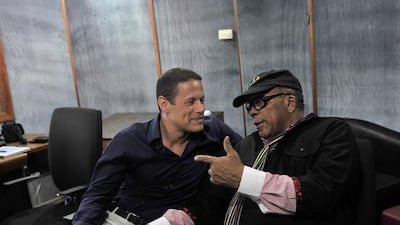It was not supposed to turn out this way. After completing his degree in engineering and business at the UK’s Cambridge University 15 years ago, Badr Jafar returned to the UAE to take his rightful place in the family business, the Sharjah-based petroleum and business conglomerate,The Crescent Group. Upon his return, however, he informed his family that he had different plans.
“I told them I wanted to work in the fashion business,” he recalls.
“As an Arab, Emirati male, with a degree in engineering and who comes from a family who are deeply understanding and supportive, it was still a challenge for them to accept that I wanted to gain experiences that they may have not expected me to.”
After receiving the blessings of his family, Jafar immersed himself in the fashion industry and travelled to London, New York and Italy to learn from the industry’s best, including the Japanese textile leader Tomio Taki, a former collaborator with Donna Karan and Anne Klein.
The end result was Colio Fashion, a brand that designed, manufactured and distributed high-end ties. It was successful, albeit short- lived – it was sold to global investors after a three-year stint during which its designs were available in 11 countries.
The venture signalled the end of Jafar’s foray into fashion as he turned his focus back to the UAE and the family business.
“That was always the plan,” he says. “I am always on the look-out for new experiences and this one challenged me very effectively to learn new skills in both the artistic and business worlds.”
It is the blending of these two skill sets that defines Jafar.
The 34-year-old is part of a growing trend of Emiratis mixing business acumen with the arts – other examples include the twofour54 chief executive Noura Al Kaabi and the film director and brand ambassador Ali Mustafa.
Jafar is also behind a slew of ground-breaking UAE initiatives focusing on harnessing the region’s artistic talent.
In 2011, he was introduced, through Jafar business contacts, to the Oscar-winning actor Kevin Spacey, with whom he joined forces to launch The Middle East Theatre Academy, a not-for-profit organisation offering training and support to regional actors, writers, directors and producers.
Spacey visited the UAE for a series of workshops as part of the foundation’s launch and is set to return next year to help lead an intensive three-week course exploring all the creative aspects of the theatre world. Yet to be officially launched, the course will be open to 16-to 24-year-olds who pass an online audition.
While Jafar is excited for the forthcoming project, he is adamant that the training and Spacey’s star power alone are not enough.
And this is when the life-long theatre lover transforms into a hard-nosed chief executive, as he makes clear that the theatre foundation will need to yield solid results to be deemed successful.
“This is a content initiative,” he says. “The Arab world is blessed with plenty of bricks and mortar, so we have all the buildings and theatres. What we actually need is to build good local content.
“The aim is then to export that content globally so that people can finally hear authentic stories from us to the world. That has not been done yet and this is our aspiration.”
But when it comes to his latest venture, the entertainment expo Dubai Music Week, Jafar unapologetically states that it is for profit.
Sticking to his ethos “of not reinventing the wheel”, he teamed up with a music-industry heavyweight, the legendary producer Quincy Jones, to create the joint company Global Gumbo Group.
The inaugural event was held last September, with appearances and concerts by the superstars will.i.am, Timbaland and Selena Gomez.
Jafar confirmed that the event will return to Dubai early next year.
While the star-studded musical performances have understandably dominated the spotlight, Jafar says the event’s real value lies in the interaction between international exhibitors and brands and local talent.
“We wanted it to be a more holistic experience, where people are not only exposed to concerts but also to seminars and workshops,” he says. “We wanted to create an ecosystem where ideas can flourish.”
Again, Jafar makes it clear that Dubai Music Week’s effect will ultimately be judged by what happens long after the doors close. He hopes the event will unearth a new legion of cultural ambassadors.
“That’s because these kinds of ambassadors have the unique ability to connect with people on a non-political level,” he says.
“This is one of our greatest opportunities. You know, we have more than 400 million people in the Arab world, but if you ask people from outside the region to name one of our musicians, actors or artists, you will be hard-pressed to find people that will identify them. That is not acceptable and we want to change that.”
Jafar also wants to inspire some cultural changes closer to home. He hopes his success inspires other Emiratis not to view their love for the arts as a side project, but instead combine it with their interests to make a worthwhile contribution to the UAE and the region.
“My message to the youth is arts is the essence of creativity,” he says. “Whatever field they are in, from business to politics, creativity is key. Artists also need to identify themselves as essential cogs in the wider wheel of the economy.
“They are not ‘just a nice thing to have’, but very essential.”
• Trendsetters is Arts & Life’s eight-part summer series profiling UAE innovators excelling in their fields.


